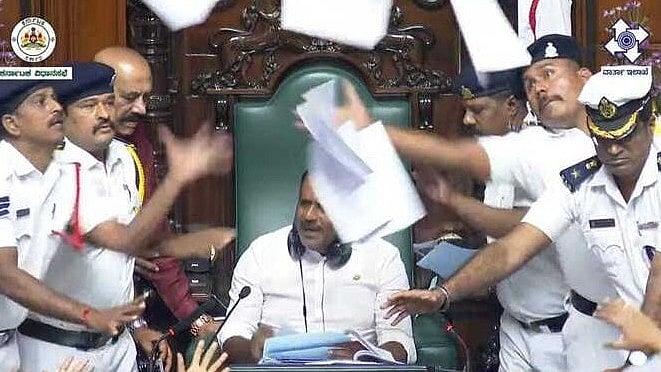
18 BJP MLAs suspended amid 'Honey-trap ruckus' in Karnataka Assembly.
Credit: DIPR screengrab
Karnataka Cooperation Minister K N Rajanna has blown the lid off a political scandal so sensational that it could rival the most lurid episode of a prime time soap opera.
Speaking in the Assembly, he claimed that 48 bigwigs—leaders at the state and central levels, as also judges—have been snared in honeytraps, with Rajanna himself being one of the attempted targets.
This revelation is neither isolated nor unprecedented. Over the past decade, two ministers were forced to resign after their private indiscretions became public scandals, while a former MP is currently serving time in jail. Honey trapping is typically a covert operation where a target is lured into a compromising situation often through romantic or sexual enticement. The encounter is then secretly recorded, providing material for coercion, blackmail or political manipulation.
In this case, the honeytrappers appear to be part of an organised racket, and their targets were individuals wielding considerable influence. The consequences are not just reputational. If true, this could have led to compromised policy decisions, leaked state secrets, and abuse of power. Adding to the murkiness are the now infamous pen drives said to contain damning footage. Over a dozen political figures, largely from the BJP, have rushed to obtain injunctions to prevent their contents from being released. One may ask: “If there is nothing to hide, why the legal scramble?” Chief Minister Siddaramaiah has promised a thorough inquiry, ostensibly to protect politicians while punishing the blackmailers. However, this position demands scrutiny. The underlying question remains: who is at fault—those who set the traps, or those who willingly stepped into them? Deputy Chief Minister D K Shivakumar was more pragmatic: “They say hello only if you say so. Nobody comes if you do not respond.” His message is clear: no honeytrap succeeds without consent, and those who step into such a trap fail in judgement and character.
It is unfortunate that the legislature’s time was consumed by debates on what is essentially preventable personal failings. This is not a state emergency, rather, it is a private disaster for public figures who should have known better. Yes, the honeytrap operators must face justice. But so too must those who, entrusted with public responsibility, indulged their weaknesses. If their reputation now hangs in balance, they have none to blame but themselves. Moral uprightness, and not court orders, should have been their shield. Karnataka’s electorate deserves better than legal cover-ups and legislative theatre. They are entitled to leaders with some spine and substance—not those brought to their knees by seduction. These politicians need to be exposed. If they cannot bear the sting, they should not dance with the bees.
